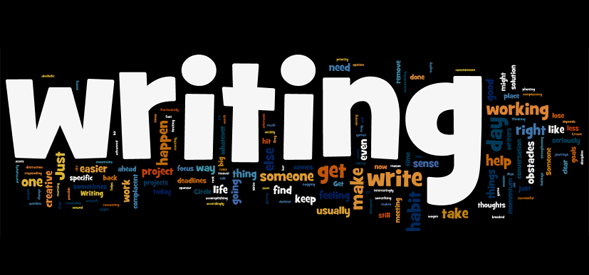Writing consistently, regularly, and honestly is a challenge.
But it’s a challenge worth meeting.
And when it comes to delivering on that task, it turns out that discipline is an over-rated solution when it comes to writing. Having a writing system and habit is what gets it done, day in and day out. But even when you have a writing habit in place, you still have to constantly refine it, improve it, and raise the bar when you get complacent.
Because there are times in our writing lives when we can become complacent. We can hit rough patches and take breaks. We can lose momentum or get our writing disrupted by travel or work or kids or LIFE. We can lose confidence in our projects and our ability to write. We can get knocked on our asses by feedback that takes weeks to recover from. And we can also fall into writing without purpose or intention, particularly when we don’t have specific deadlines or milestones we’re trying to hit.
The problem is that this kind of complacency will suck the vibrancy out of you, your writing, and your writing life. You might appear to be productive, as one of my Writer’s Circle members said this week, but really, you’re asleep with your eyes open and you know it. And it doesn’t feel good.
The solution?
Recommitment.
When you find yourself in this place, it’s time to recommit to yourself as a writer. To your writing. To your writing life.
It’s about shifting back into a higher gear. Treating your writing like the life’s calling it is. Making it a priority. Making it happen.
7 ways to recommit to your writing
When you find yourself phoning it in or going through the motions, here’s what you can do to change it up and get back on track with what you were put here to do:
- Write like your life depends on it. You’re here to write, right? So do that. Take your writing seriously. Move mountains if necessary to make it happen, even if you’re hitting only your barest minimum “rock bottom goal” for the day. It counts, and it makes a big difference to your psyche when you honor your commitment to yourself this way.
- Up your game. Check in with yourself about how you’re feeling about your writing. You might be feeling lulled into a sense of complacency. You might be feeling good about your writing and what you’re accomplishing. But if you have a nagging sense that it’s time to require more of yourself, do that. Set daily, weekly, and monthly goals to help you make that happen. Look for deadlines or create them. Get accountability into place for yourself. Do what you’re saying you’re going to do. Create a sense of alertness, urgency, or briskness for yourself about your writing so you remember why you are here and make it happen.
- If today you can’t write, couldn’t bring yourself to write, don’t want to write, hate writing, or something else happened that stopped you from writing, TELL SOMEONE SAFE. This is a little bit like falling off the wagon if you are a recovering alcoholic. You’ve got to talk to your sponsor ASAP. Get to your people as fast as you can and get help getting back on track. Tell them/us your worst, darkest thoughts about writing. We can take it. We’ve probably had those same thoughts too. The thing is, we ALL have obstacles to writing. They run the gamut from perfectionism to distraction to limiting beliefs to creative confusion and apathy. Our collective work as writers is to systematically unearth and remove these obstacles one by one so they no longer stop us from doing what we were put here to do. (This is a big focus of what we do in the Writer’s Circle, and what’s particularly brilliant about the system is that seeing other writers remove obstacles helps us do so too.)
- Stay out of comparison. Everyone is on their own path when it comes to writing. Someone else will be writing more than you, someone else will be writing less. Someone will be more successful than you are right now and someone will be less so. IT DOESN’T MATTER. We are all on our own writing journeys. What matters is that you are meeting your own goals and working on your writing habit and writing career based on where you are and where you want to go. So you if you see someone writing for 4 (even 8 or 10!) hours a day and someone else aiming to write for 5 minutes a day, don’t worry about it. Just keep your eyes on your own paper and what you are doing for yourself. It’s all good. Just keep writing.
- Plan ahead. If you’re writing for 5 of 7 days per week or taking holidays off or whatever it is that you are doing — decide ahead of time. Don’t have the conversation about “IF” you are writing today. Know that you’re writing or not writing that day and act accordingly. Have the conversation about “WHEN” you will be writing. It’ll be much easier that way.
- Be as clear as possible about what you’re working on. This whole writing thing is a LOT easier if you have one specific project you’re working on and keep working on until it’s done. Particularly if you’re in writing habit building mode, you may find it easier to focus on simpler writing, like doing morning pages or responding to journal prompts to get started. But ultimately, being crystal clear about your project choice will give you direction, momentum, and purpose. Working on multiple projects at once (aka project stacking or layering) is an advanced skill, in my opinion. So save that for later if you’re working on strengthening your writing habit right now.
- Just do the writing. We called our group the “Just Do The Writing Accountability Circle” in the past. The reason we say “just do the writing” is that it really is the right solution in most cases. Thinking about writing, talking about writing, avoiding writing, and otherwise dithering about writing usually doesn’t fix whatever the problem is, whereas writing usually does. I say usually, because sometimes there are creative wounds that need healing, and sometimes we need to write about the writing to find out what’s going on with the work, but interestingly the way through both those things is still writing. So just do the writing and you’ll be in good shape. :) (And if you need help with a creative wound, I’m here to help.)
Where are you with your writing right now? Is it getting to be time to step it up a notch? Are you phoning it in? What on this list inspires you most to make a change?
Tell us in the comments so we can celebrate with you and help you keep your word to yourself.


 Note from Jenna: This is a guest post from my friend, writer, and favorite business consultant, Naomi Dunford.
Note from Jenna: This is a guest post from my friend, writer, and favorite business consultant, Naomi Dunford. He said, “Remember that cupcake we got out of the ATM in Beverly Hills? Remember how it was perfect?”
He said, “Remember that cupcake we got out of the ATM in Beverly Hills? Remember how it was perfect?”












